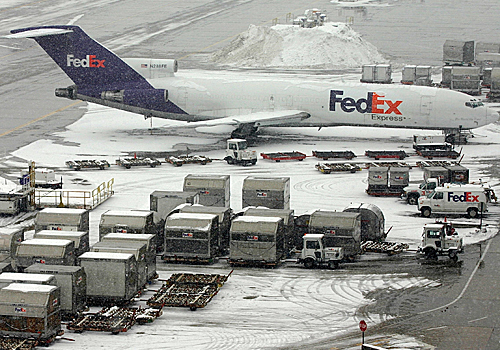
FedEx plans further cost-cutting in express network
FedEx chairman Fred Smith blamed policy decisions in Europe and America for slowing global trade, as his company today cut its guidance on expected earnings for the rest of this year. As it issued results today for the first quarter of its 2013 fiscal year, the Memphis-based integrator said it is planning to announce more cut-backs next month to respond to the tough trading conditions and shift of customer shipments from premium air services to lower-cost economy options.
But Smith insisted today that the extra measures to cut costs would not include lay-offs.
FedEx issued a profit warning earlier this month, warning investors that earnings this year were not going to be quite as rosy as previously expected since the global economy had fared worse than hoped.
Today executives said FedEx share earnings would likely be in the $6.20 to $6.60 per share range for the full 2013 fiscal year, not the $6.90 to $7.40 forecast previously.
In the latest quarter’s results, the company said overall revenue for the quarter was up 3% to $10.52bn for the three months, but the company’s net income was down 1% compared to the same quarter last year, to $459m.
Good gains in FedEx Ground and improvements at now-profitable FedEx Freight were not enough to counter a decline in the performance of FedEx Express.
Boosted by ecommerce, FedEx Ground saw its revenues up 8% (to $2.46bn) in the quarter and operating income up 9% (to $445m) compared to the same period last year, while FedEx Freight saw revenue up 5% to $1.4bn and income up 114% to $90m.
But FedEx Express saw revenues up only 1% to $6.63bn for the quarter, with operating income down 28% from a year ago, to $207m.
Shift to economy

With trade in China cooling as a result of a slowdown in demand for goods in Europe and America, FedEx Express has found its results suffering
FedEx Express has been hit by a tendency for customers to shift to less costly alternatives, with volumes moving from premium services like the FedEx International Priority towards low-cost options like FedEx International Economy, and shipments moving from air transport to ocean transport options.
Smith said today that part of the issue was that prices for luxury electronic goods were coming down, resulting in a lower value per pound for consignments. This made it more economic for consignments to be deferred air or even ocean shipments.
“A product launch from Microsoft or Apple is not going to provide the kind of sustainable growth we’ve previously seen,” he said.
Yet the FedEx chairman said his company was actually taking market share in the difficult conditions for intercontinental express.
“What’s going on in the movement of goods internationally in air cargo segment the door-to-door express segment is taking share from the traditional airport-to-airport segment,” he said, adding that the air cargo segment was also losing business to ocean shipping alternatives as shipping lines improve their container services.
He said of the air forwarding market: “That market is not growing at all and in the last few months has contracted 3%.”
However, Smith said that the gains in FedEx Express’s door-to-door volumes were mostly going into the less-profitable International Economy service.
Talking to analysts, FedEx executives said the company’s premium International Priority service had seen its volumes shrink by 2% year-on-year in the first quarter, but volumes in International Economy had grown 13%.
Domestically within the US, FedEx has seen volume shift from its FedEx Express services to its FedEx Ground and FedEx SmartPost services in the wake of “weakness” in the US economy. FedEx Express domestic parcel volumes fell 5%, while FedEx Ground domestic parcel volumes grew 18% in the quarter.
However, executives said the company treated its FedEx Express and FedEx Ground services as a single portfolio in the United States, and argued that if taken together the domestic US business was doing very well.
Alan Graf, the FedEx Corp chief financial officer, revealed that around half of the decline in the domestic US FedEx Express business during the quarter had been caused by one mobile phone industry customer switching from FedEx Express to a mixture of FedEx Ground and FedEx SmartPost services. SmartPost is a budget delivery service used particularly by ecommerce merchants run in partnership with the US Postal Service.
Cost-cutting
As a result of the shift towards economy options, FedEx is now in the process of a significant cost-cutting initiative, with the intent to refocus its global express network towards the greater demand for economy air transport compared to the premium priority service.
FedEx has already been reconfiguring its domestic US air fleet since this summer, and last month announced plans to cut its workforce in administrative and support areas.
Overall efforts are being taken to reduce labour hours and flight hours, with an emphasis on flexible capacity within the air network rather than adding scheduled flights to respond to increases in demand.
Further cost-cutting measures are set to be announced at an investors’ meeting on October 9th and 10th.
“We intend to take a significant amount of cost out of Express,” Smith said.
“We are not going to lay off people and we are not going to take some draconian steps – it’s all being very carefully thought out, and I think you are going to be very surprised at the magnitude,” he told investors today.













